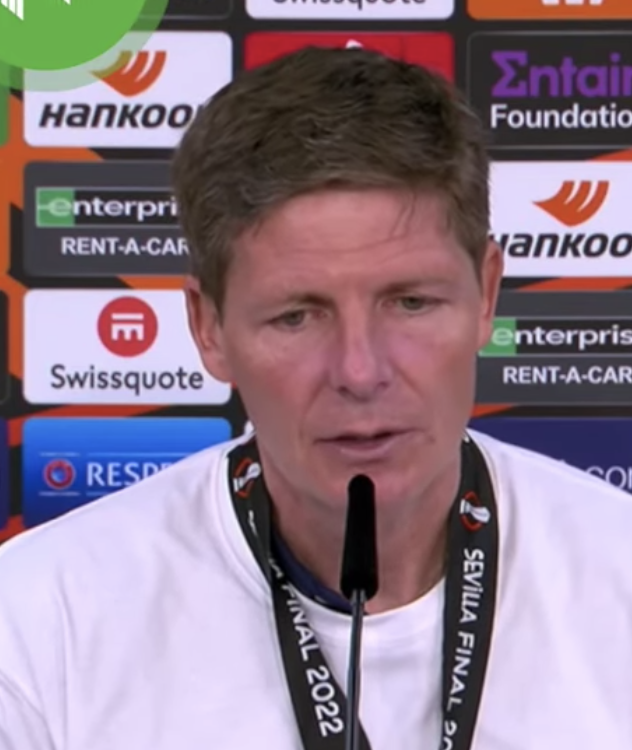The Austrian moved into coaching after a life-threatening brain haemorrhage ended his playing days.
There was barely an hour between Crystal Palace announcing Roy Hodgson’s departure on Monday afternoon and then breaking the much anticipated news that Oliver Glasner would be their new manager, with talk of the Austrian’s arrival having been rumoured for some time beforehand.
Glasner has long had an avid admirer in John Textor, the Palace co-owner who also has a share in Olympique Lyonnais and had previously contemplated hiring the out-of-work Austrian for his French club.
Textor and Steve Parish eventually got their man, and he was soon in the stands at Goodison Park to watch the Eagles’ 1-1 against Everton on Monday night.
His new side sits five points above the relegation zone, but throughout his managerial career Glasner hasn’t just matched expectations, normally he exceeds them.
His most notable success was winning the Europa League with Eintracht Frankfurt in 2022, beating Rangers in the final having knocked out Barcelona and West Ham along the way.
He had won trophies during a 16-year playing career, mostly as a defender with SV Ried, but that came to an abrupt end in 2011 when, at the age of 36, the Austrian was rushed to hospital in Copenhagen and underwent emergency surgery after suffering a brain haemorrhage during a training session.
Doctors advised him to retire, and he moved into coaching. He started as an assistant coach to Roger Schmidt at Red Bull Salzburg, helping them win the Austrian league title, but instead of following Schmidt to Bayer Leverkusen, Glasner returned to Ried in 2014 to embark on his first managerial job.
High-pressing and quick transitions was the style that Glasner implemented, a style that is synonymous with the Red Bull footballing school and he carried this ideology into his next job the following year, when he dropped down a division to join LASK, for whom he had once played briefly on loan, where he balanced being a sporting director and head coach and won promotion to the Austrian first division in 2017.
Upon joining the elite of Austrian football, his LASK would manage to hold their own.
The newly-promoted side featured in the Europa League after their first season in the Austrian Bundesliga, and then in 2019 they finished runners-up to RB Salzburg. This led to him being headhunted by VFL Wolfsburg in the Bundesliga, and he took them to the third-best point haul in their history and secured Champions League football in 2021.
It wasn’t just his tactical ability that impressed the players at Wolfsburg, it was the freedom that he gave them and his honesty that made him a well-liked figure among the squad, something that has been been evident wherever he has gone.
He believes players should be treated as adults, not micro-managed, and also ensures they players see the real Glasner, not someone who would put on a façade. Glasner’s openness, however, led to disputes with the Wolfsburg board, and the Austrian’s unhappiness at their lack of transfer activity eventually saw the relationship end in 2021, having finished in fourth place.
By start of the 2021/22 season, he moved 200 miles south to Frankfurt where his most famous success would occur, winning the Europa League and as a result leading Frankfurt into their first-ever Champions League campaign.
But last summer he left Frankfurt, and throughout his seven months of unemployment, he has been in demand, before being lured to the Premier League by Palace.
Glasner’s priority now will be to guide the club away from the relegation zone without key players such as Eberechi Eze, Michael Olise and Marc Guehi.
But Glasner has shown he is flexible with his approach, implementing different formations depending on the opposition and availability of key players.
If Palace survive their final 13 games successfully, he will look to impose a more ambitous plan for Crystal Palace next season.
And if the board aren’t aligned with that, he isn’t afraid to let them know.





























